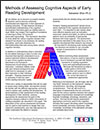A-Z List of Free SEDL Publications
Below is a list of SEDL publications available free online. There are additional publications available in the SEDL Store, where SEDL lists the publications available for sale.
There are 252 free resources available to you.
Click here to show publications starting with the letter or number:
A, B, C, D, E, F, G, H, I, J, K, L, M, N, O, P, R, S, T, U, V, W, Y
| Making Consistent Decisions about Accommodations for English Language Learners: Research Summit Proceedings (2008) In March 2009, researchers and practitioners convened in Austin, Texas, for a research summit on linguistic accommodations in instruction and on assessments for English language learners (ELLs). This online publication describes the proceedings and outcomes of the summit. | 
|
| Maryetta School: The Center of a Rural Community: Issues About Change, Volume 5, Number 1 (1995) This paper six key leadership strategies that led to academic improvements and high parental involvement at an award-winning, rural Oklahoma school where 82 percent of the students are American Indians. | 
|
| Math in Afterschool: A Guide to Using the Afterschool Training Toolkit for Professional Development (2008) The Afterschool Training Toolkit materials are designed to illustrate techniques and activities that leverage student curiosity to make mathematics in afterschool both enjoyable and relevant. This guide provides professional development ideas for each of the seven promising practices in afterschool math enrichment. | 
|
| Math in Afterschool: An Instructor's Guide to the Afterschool Training Toolkit (2008) The seven promising practices in afterschool math identified in the Afterschool Training Toolkit are as follows: Finding Math; Math Centers; Math Games; Math Projects; Math Tools; Math Tutoring; Family Connections. When used with the Afterschool Training Toolkit, the lessons in this instructor’s guide will help you master these promising practices. Once you become proficient at these practices, you should be able to use them to develop other math lessons. | 
|
| Measuring Change Facilitator Stages of Concern: A Manual for Use of the CFSoC Questionnaire (1991) This book is for use with change facilitators such as principals, staff developers, and teacher leaders who have concerns that are identical in dynamics to those on the front line of educational innovation. | 
|
| Measuring Implementation in Schools: Innovation Configurations (2006) This updated manual describes how to use Innovation Configuration Maps to clarify what an innovation or change looks like along a continuum from high-quality implementation to least-desired practices. | 
|
| Measuring Implementation in Schools: Levels of Use (2006) This updated manual discusses how individuals behave and react with respect to specific change. The tool helps researchers and evaluators determine the extent to which an innovation is being implemented by distinguishing among three levels of nonuse and five levels of use. | 
|
| Measuring Implementation in Schools: The Stages of Concern Questionnaire (2006) This updated manual explains how to use and score the Stages of Concern Questionnaire, which assesses teacher concerns about new programs and practices. The product includes a MS Word version of the questionnaire and scoring sheets, as well as a scoring program in Excel and SAS formats. | 
|
| Meeting the Needs of Diverse Learners: Texas Comprehensive Center Briefing Paper, Number 7 (2011) Effectively meeting the needs of an increasingly diverse population of students presents challenges for educators across the United States, including the Texas and Southeast Comprehensive Center regions. To support ever more rigorous achievement expectations, educators need to provide flexible, accessible curricula that give students’ multiple pathways to success and secure opportunities for all children. | 
|
| Methods of Assessing Cognitive Aspects of Early Reading Development (2002) This article helps teachers better understand what reading abilities need to be tested and how to go about testing the essential areas that are so important to reading development. | 
|
| Mosaic: An Integrated Approach to Mathematics, Science, Technology, & Language (2012) This K–5 supplemental instructional program provides lessons and resources that integrate math, science, and technology while supporting English learners and academic language skills. The program is available online free of charge. | 
|
| Multiple Mirrors: Reflections on the Creation of Professional Learning Communities (2000) This publication is a collection of stories written by the co-developers who worked with SEDL in assisting schools to create professional learning communities in a sample of schools. | 
|
